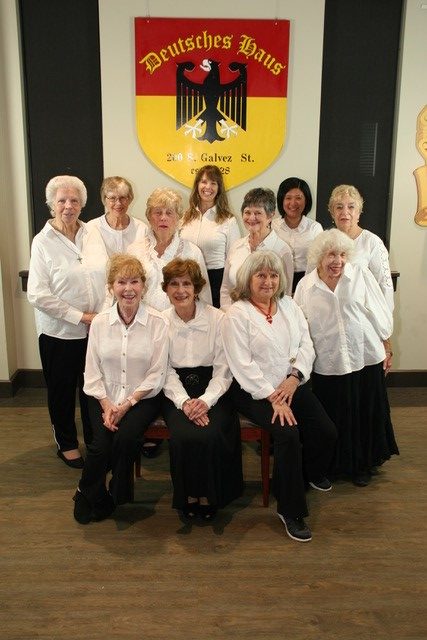Led by Steven Edwards
Come meet the members of our choirs and join one of our earliest traditions at the Haus.
Currently we are preparing for our choir concert on June 3, 2022, and the 2023 Nord-Amerikanischersaengerbundfest, the North-American singing society festival, which will take place June 9–10.
All voice parts are most welcome. While a knowledge of German is helpful, it is not necessary, and being of German heritage is also not necessary.
<<<<<>>>>>
One of the nation’s best-kept secrets are the German choirs that crisscross the country.
In 1849, Cincinnati hosted the first national singing festival, and New Orleans hosted the 1890 national Saengerfest across from Lee Circle with 1,700 voices gracing the city. Save for World War I, World War II, and the pandemics, the national singing festivals have taken place every three years since 1890.
In 1928, Sigmund Odenheimer, a German immigrant, became the first President of the Deutsches Haus, located at 200 South Galvez Street. Bringing together the city’s five German men’s choirs was his first order of business. Although Mr. Odenheimer’s granddaughter, Carol Odenheimer Kaplan, never knew her grandfather, she honors his memory by graciously volunteering at the Oktoberfest each year.
Throughout the country, the German clubs, or Deutsche Haeuser, were established to provide accommodations for the members of the men’s and women’s choirs to meet and rehearse. To preserve this long-standing choral tradition, the Deutsches Haus Damenchor and Saengerchor invite you to join us.
We are fortunate to have Steven Edwards as our director. Earlier in his career, he led the Milwaukee Liederkranz and is most familiar with German song and culture.
As we say at the Deutsches Haus: Wo man singt, da laesst Dich nieder, denn boese Menschen haben keine Lieder. Whenever you are in the company of people who sing, they are happy and relaxed. Evil people have no songs.
<<<<<>>>>>
Since several of the organizations that joined together to form Deutsches Haus were men’s singing clubs, it was only natural that one of the first groups formed in the new Haus would be a singing society: the Saengerchor Deutsches Haus. This chorus, which has been in existence for eighty-two years, is dedicated to the preservation and enjoyment of German folk songs. Just as Deutsches Haus struggled to maintain its existence during the dark days of World War II, the Saengerchor, too, found that its membership dwindled to a very small group of dedicated singers. To allay fears that the singers were in any way political, representatives of the FBI were invited to attend all rehearsals. Shortly after the war, membership in the Saengerchor rebounded and the singers were soon able to return to their practice of holding annual spring and Christmas concerts. Since 1928, the Saengerchor has been a member of the North American Singers Association (NASB), a national group composed of German choruses in states throughout the mid-western and southern parts of the United States. Every three years members of the NASB come together for a national Saengerfest, which attracts nearly 2000 singers. In 1958, the Saengerchor had the honor of hosting the Saengerfest in New Orleans. The Saengerchor meets every first and third Friday to enjoy German song, and we will join with the Damenchor in sponsoring an annual dinner/concert. We hope that in the near future we will —- again with the Damenchor—- be able to offer an annual Christmas concert. We are most grateful to our former singers whose vision it was to organize the Deutsches Haus more than eight decades ago. We wish to extend an invitation to all men, regardless of musical ability, to join with us and to help us preserve the tradition of German song. A speaking or reading knowledge of German is NOT required. Our only requirement is a love of German song and a desire to sing.
Damenchor

